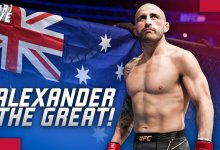Is the Korean Zombie still Mr. Violence?
Are there ever any widespread MMA opinions that you just can’t swallow, but seemingly everyone holds to them like they are absolute truth?
For me, it’s about Chan Sung Jung vs. Yair Rodriguez. I did not watch this fight live. I saw the knockout posted on the internet, because it was everywhere, and I ended up seeing the full fight when the UFC uploaded it to YouTube, and I later watched it on Fight Pass for a second time. Of course, I did not watch it 49 times, so take everything I am about to say with a grain of salt.
From how people were talking about the fight, I was expecting something like Anderson Silva vs. Chael Sonnen 1. I was expecting to watch Yair take a beating for five rounds before winning via a highly unlikely spinning elbow knockout in the final second of the final round.
But that’s not what I saw at all. It was almost shocking, the disparity between what I was expecting based on what people were saying, and what I saw.
To be clear, Chan Sung Jung would have won that fight if he had not been knocked out. One of the judges had the fight tied at two rounds apiece going into the final round, but two judges had Jung ahead three rounds to one. So even if all of them scored the final round for Rodriguez, Jung would have won a split decision.
But my point is: this fight was very close and very hard to judge. There was a lot of back and forth action; both men had their moments, in every single round. And both men took serious damage. And although Jung was the fresher man in the latter rounds, Yair was still effective and still doing his regular flashy stuff, such as a double roundhouse kick and an attempt at an imanari roll, both in the fourth round.
And in the fifth, even before the knockout, Rodriguez stunned Jung with a right hand, if only for a moment. Their faces said all we needed to know. Both men were battered and bleeding by the end of the third round. It was a war.
So why is this fight seen as a fluke knockout for Yair in an otherwise clear and obvious victory for Jung? A lot of it may have to do with the fact that a lot of the strikes Yair landed were to the legs and to the body, whereas almost all of Jung’s strikes landed were to the head. People tend to value head strikes more than strikes to the body or the legs, which is fair.
But then there is another issue: the fact that a lot of people just don’t like Yair.
But do you know what I think is the biggest reason why, in the public perception, this fight was one-sided?
It’s because Chan Sung Jung is that much of a fan favorite. He gets that much benefit of doubt.
Academics could do a case study on how Chan Sung Jung became so beloved by MMA fans. This is a very special case. While MMA is an international sport, the North American fan base matters a lot more than the rest of the world, in marketing and profitability terms. The PPV model is still the vehicle that drives the business of fighting, and the American market is what drives this vehicle.
For example, when did Khabib Nurmagomedov start being a big star? He had been a big deal for a long long time in the former Soviet republics. And yet, he got paid just 100 thousand dollars to fight Michael Johnson, in what Khabib considered his first big paycheck.
It was not until after he beat Conor McGregor that he truly became a big star in the sense of being a big money star. He gained more American fans, more casual fans, and of course it helped that Arab governments in the Persian Gulf region are willing to pay big bucks to host UFC events.
Nowadays, Nurmagomedov probably makes more money from sponsored instagram post than he did from fighting Johnson. It doesn’t matter how many stadiums in Tajikistan are packed full of fans cheering you on, or how many Uzbek mothers want you to bless their baby. Those fans, as ardent as they may be, don’t drive the MMA economy.
So how did Chan Sung Jung gain so many North American fans? His English is not so strong, and having good English is proven to be a big factor in becoming a star. Even if it’s broken English, it goes a long way; as long as you have the confidence and the ability to speak without an interpreter.
How did Jung become the exception to this rule? It’s simple. And it goes back to a simpler time. To be specific, the year 2010. WEC 48: Chan Sung Jung vs. Leonard Garcia. The epitome of “swangin’ and bangin’.”
Some of the fights that we consider “the best,” are the very same fights that are often used to discredit the sport as human cockfighting. And honestly, it is very hard to rationalize Jung vs. Garcia.
Regardless, this was enough to make Chan Sung Jung a fan favorite in the same vain as Nate Diaz pre-McGregor, or Justin Gaethje today. He was the darling of the hardcore fans while remaining relatively unknown to the masses.
In fact, he has headlined the last six events in which he has fought. And in the promotional materials, and even in the graphics during the broadcast, another important aspect of Jung’s appeal is on prominent display: his nickname.
Korean names are all three syllables long; there are no exceptions to this, as far as I know. They are quite easy to pronounce regardless of your language background. So this is more a branding move than anything else. When you put his nickname and his fighting style together, from a fight fan’s perspective, that’s really all you need in order to develop a bond.
Chan Sung Jung is the man who walks forward with his hands down, takes a beating and never even flinches. “The Korean Zombie” was the perfect fit.
Jung built a reputation for himself as Mr. Violence. And it was well deserved. His earlier fights are incredibly violent, and his stoic disposition served to make it seem even more intense.
But here is what is sometimes overlooked: he is not the same fighter today as he once was. He is not doing what he did in the WEC, anymore. He can still scrap, and he is certainly willing to take damage in order to dish out damage. But he is not just walking forward, hands down (or hands on waist), no head movement, just ready for war. He is not doing the things that earned him the zombie nickname, which also happened to be the things that got him in trouble.
And this is how it should be. He is an athlete. Even if he himself does not value his health or think about long-term career prospects, surely his coaches did not care for his old style. And his career has progressed quite nicely as he’s evolved his game.
One of the mysteries back then was why Jung, such a proficient grappler, prefers to scrap? Seemingly every time he tried to initiate some grappling exchange, it was to his advantage. He was doing things that we rarely even see. Against Garcia he did a very unique back take and takedown.
He was also really good at getting body locks and doing different things with it. Sometimes he would just use the grip to land strikes. But he would get takedowns from those positions as well. And once he got his opponents to the ground, he was so good at landing effective, punishing ground and pound from their guard. He didn’t need to advance position to do serious damage.
Against Dustin Poirier, when Dustin shot for a double leg, Jung swept him into mount.
If you think of great scrambles from recent MMA history, chances are that at least a few of those would involve the Korean Zombie.
And his transitions between submissions were beautiful, as well. Again, against Poirier, he was in high mount, goes for the arm bar, then transitions to the triangle, and then back to the arm bar.
And how did this fight end? He lands a beautiful right upper cut, then goes for the whizzer and takes Poirier down directly into a D’Arce choke.
And of course, we can’t forget that Jung was the first fighter in the UFC to ever pull off a twister submission; it would take another eight years for Bryce Mitchell to become the second.
You could argue that the Zombie was a more exciting grappler than he was a striker. But ultimately, his impressive run would come to its conclusion at the hands of Jose Aldo.
There is no shame in losing to the guy that’s beating everybody anyway, but the manner in which the Zombie lost was pretty unfortunate. It was already a foregone conclusion that Aldo would have the striking advantage, but some wondered if Jung could have some success in trying to grapple with Aldo. As it turned out: no.
Not only was the Zombie unable to take Aldo down; it was Aldo who was able to secure a takedown. Late in the second round, Aldo gets the over-under and takes Jung down with an outside leg trip. In the next round, as Jung throws a flying knee, Aldo catches him, spins him around mid-air and takes him down with his back to the fence.
It was a dominant all-around performance from the champion. And sadly, it was the last time we would see the Korean Zombie for a long time.
The Korean peninsula is technically still in a state of war. The treaty that ended the Korean War in 1953 was not a permanent peace treaty but an armistice agreement. As a consequence, both Koreas take military service very, very seriously. And not even a famous athlete like Chan Sung Jung is exempt.
It only makes sense. If Son Heung-min has to do his service, then it’s only natural that an athlete in a much more niche sport has to do his service, as well.
It would be another three and a half years before Jung would fight again in the UFC.
But who knows. Maybe it was for the best. Jung had already been slowly evolving into a smart fighter with proper strategy and approach. His time off hasn’t seemed to hurt him at all, in terms of ring rust. It’s been an eternity since Aldo’s reign atop the featherweight division, and after four impressive fights since coming back – three wins and one final second loss – Jung is firmly among the top featherweight title contenders.
And in each of these fights you can see examples of his new, more cerebral approach. Against Dennis Bermudez, Jung immediately went for the over-under after Bermudez landed a big right hand, which is a position he is very comfortable in. He’s not taking senseless risks anymore; he is not trying to mess around and get knocked out, and that’s good.
Against Renato Moicano, Jung slips Moicano’s jab and lands an overhand right. If we go back to Jung’s WEC or early UFC days, can we find even a single example of him slipping a punch?
Against Frankie Edgar, Jung again is able to slip and counter; this time with a left hook. Edgar showed a lot of heart and survived for way too long for his own good, but the fight was effectively over after this punch; Edgar never fully recovered and the fight was eventually stopped.
More unthinkable than anything else, against Yair Rodriguez, the Zombie actually used feints. We have come a long way.
Ironically, ever since the official UFC graphics have been showing “The Korean Zombie” where they typically display a fighter’s actual name, Chan Sung Jung has become almost unrecognizable when compared to his earlier career. And if you like to watch him fight at a high level, that’s a good thing.









